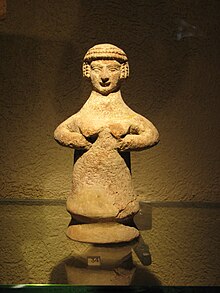
Back عشيرة (إلهة) Arabic Ашера Bulgarian Aixera Catalan Ašéra Czech Aschera German Ασερά Greek Astarot Spanish Axera Basque اشیره Persian Ašera Finnish
| Asherah | |
|---|---|
Lady Asherah (of the) Sea or Day[1] Great Mother | |
 | |
| Other names | Athirat |
| Major cult center | Middle-East Formerly Jerusalem |
| Symbol | Tree |
| Consort | |
| Offspring |
|
| Deities of the ancient Near East |
|---|
| Religions of the ancient Near East |
Asherah (/ˈæʃərə/;[2] Hebrew: אֲשֵׁרָה, romanized: ʾĂšērā; Ugaritic: 𐎀𐎘𐎗𐎚, romanized: ʾAṯiratu; Akkadian: 𒀀𒅆𒋥, romanized: Aširat;[3] Qatabanian: 𐩱𐩻𐩧𐩩 ʾṯrt)[4] was a goddess in ancient Semitic religions. She also appears in Hittite writings as Ašerdu(s) or Ašertu(s) (Hittite: 𒀀𒊺𒅕𒌈, romanized: a-še-ir-tu4),[5] and as Athirat in Ugarit. The majority of scholars hold that Yahweh and Asherah were a consort pair in ancient Israel and Judah,[6][7][8][9] while others disagree.[10][11][12]
- ^ Binger 1997, p. 44.
- ^ "Asherah". The Columbia Electronic Encyclopedia. Columbia University Press. 2022. Retrieved 7 October 2022.
- ^ Day, John. "Asherah in the Hebrew Bible and Northwest Semitic Literature." Journal of Biblical Literature, vol. 105, no. 3, 1986, pp. 385–408. JSTOR. Accessed 5 Aug. 2021.
- ^ "Word list occurrences". DASI: Digital Archive for the Study of pre-Islamic Arabian Inscriptions. Archived from the original on 6 August 2021. Retrieved 6 August 2021.
- ^ 'Asertu, tablet concordance KUB XXXVI 35 - CTH 342 Archived 5 August 2021 at the Wayback Machine', Hittite Collection, Hatice Gonnet-Bağana; Koç University.
- ^ Binger 1997, p. 108.
- ^ Dever, William G. (2008). Did God Have a Wife?: Archaeology and Folk Religion in Ancient Israel. Wm. B. Eerdmans Publishing. pp. 166–167. ISBN 978-0-8028-6394-2.
- ^ Wesler, Kit W. (2012). An Archaeology of Religion. University Press of America. p. 193. ISBN 978-0761858454. Archived from the original on 10 January 2022. Retrieved 3 September 2014.
- ^ Mills, Watson, ed. (31 December 1999). Mercer Dictionary of the Bible (Reprint ed.). Mercer University Press. p. 494. ISBN 978-0-86554373-7. Archived from the original on 10 January 2022. Retrieved 5 November 2020.
- ^ Cite error: The named reference
Wyse2015was invoked but never defined (see the help page). - ^ Sass 2014, pp. 47–66.
- ^ Cite error: The named reference
Puech2015was invoked but never defined (see the help page).